Charles E W Bean, Diaries, AWM38 3DRL 606/251/1 - 1915 - 1936 - Part 4
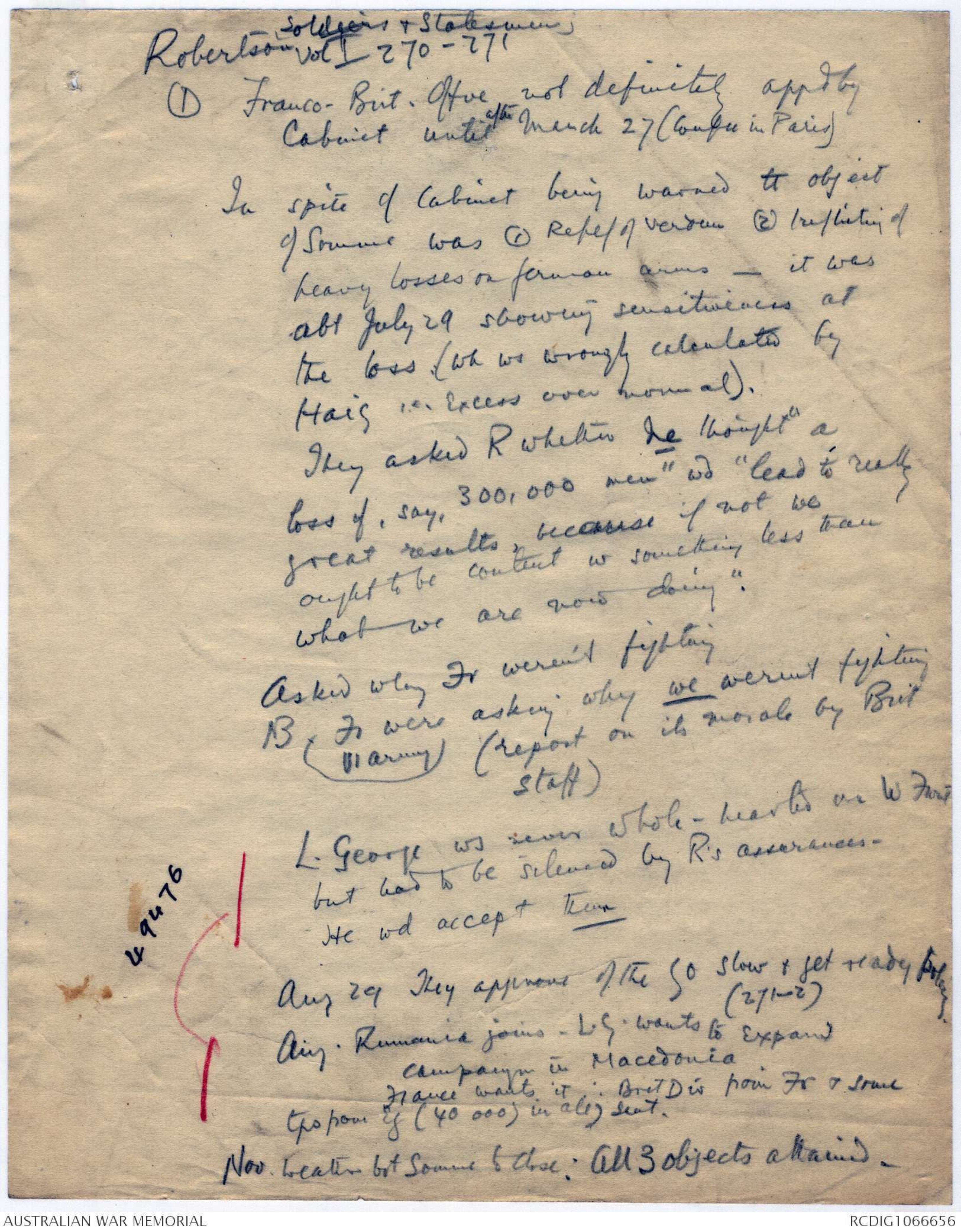
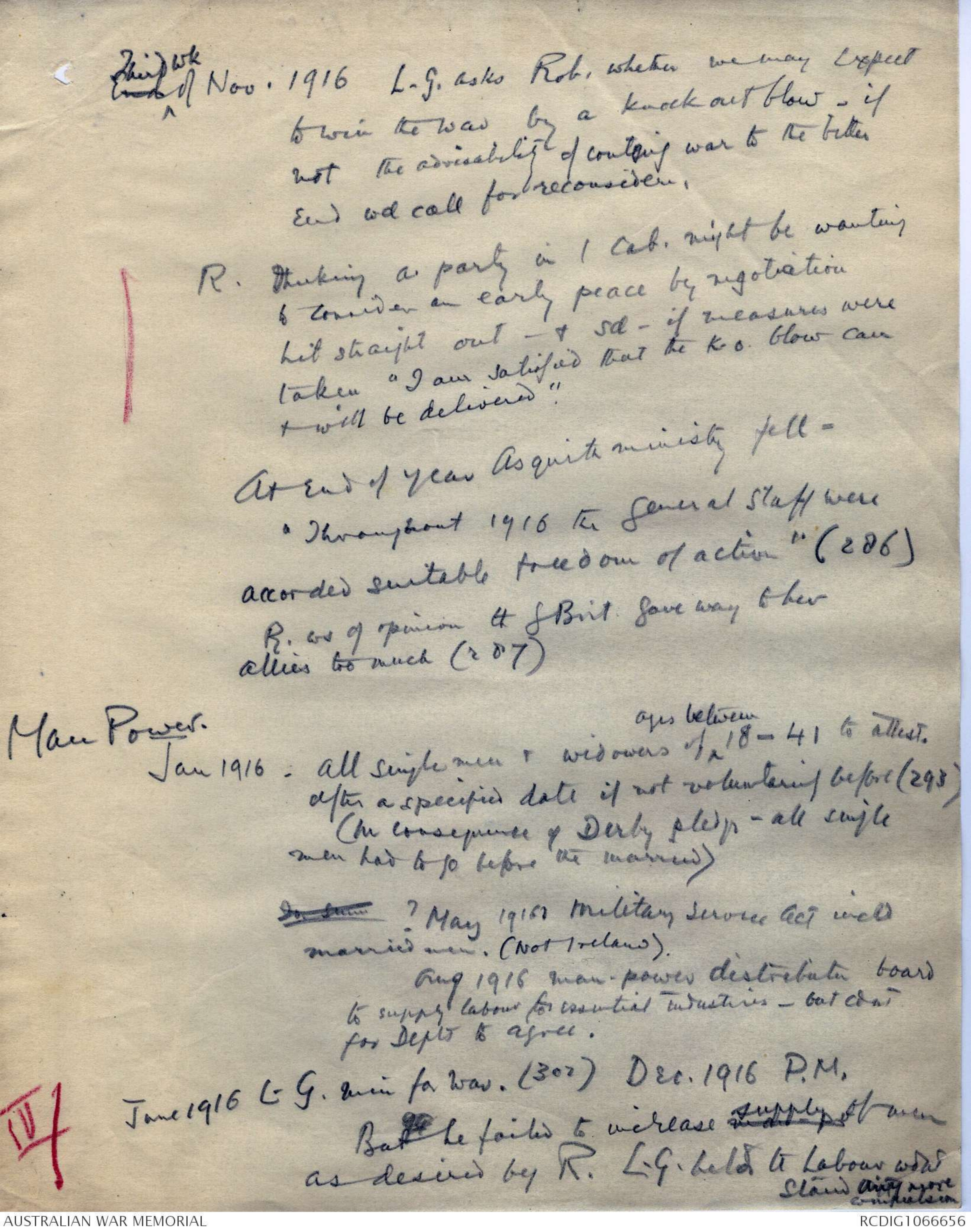
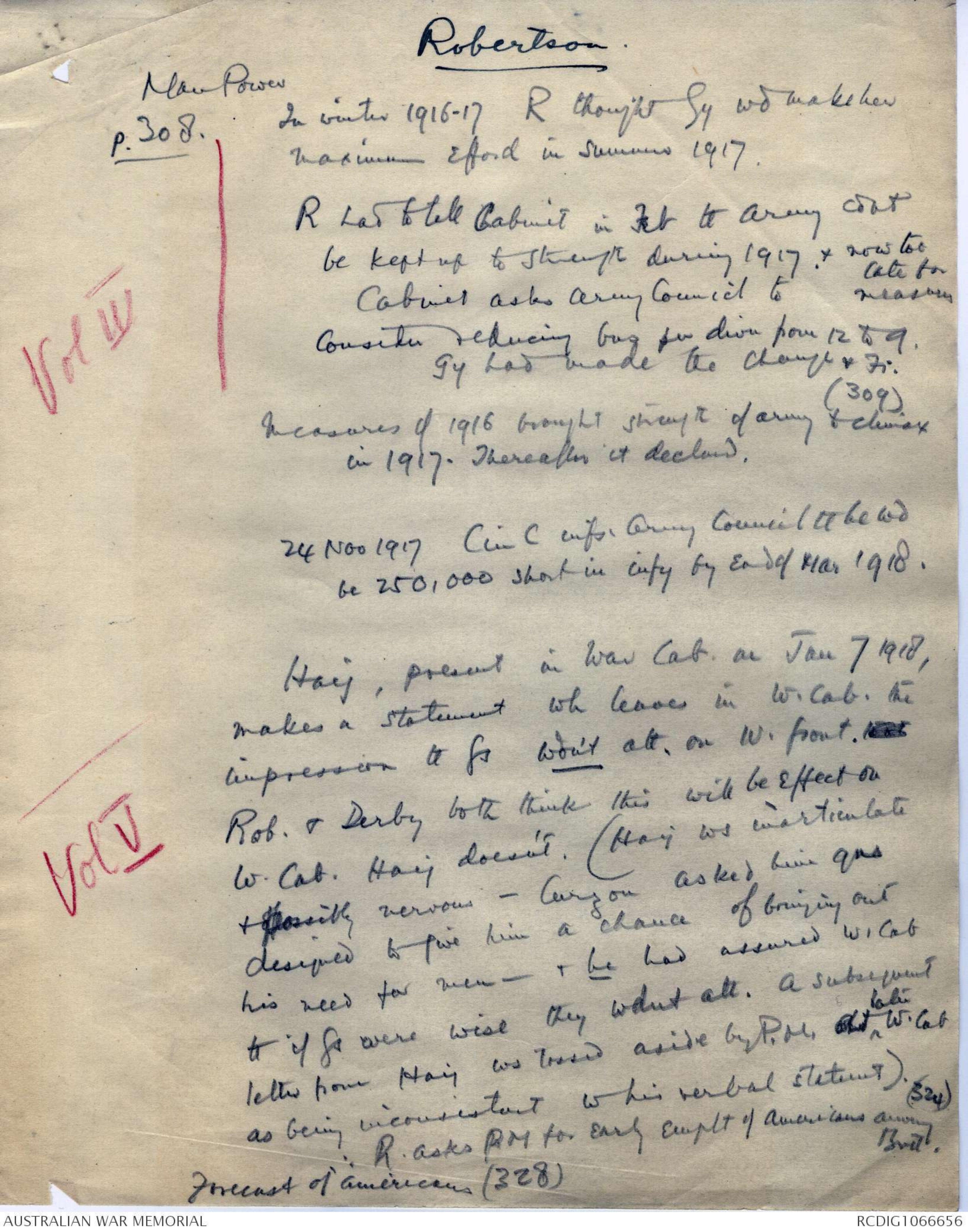
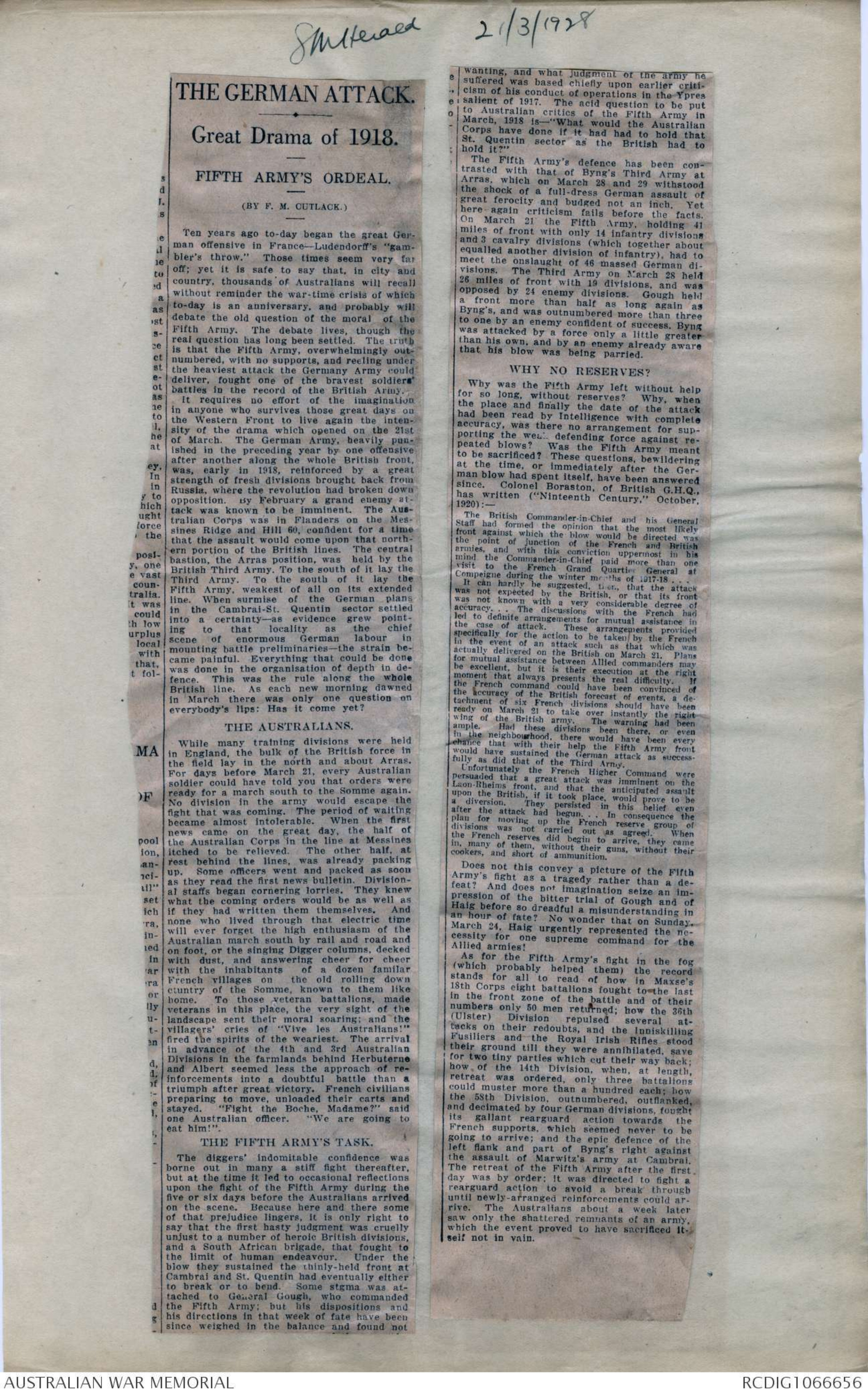
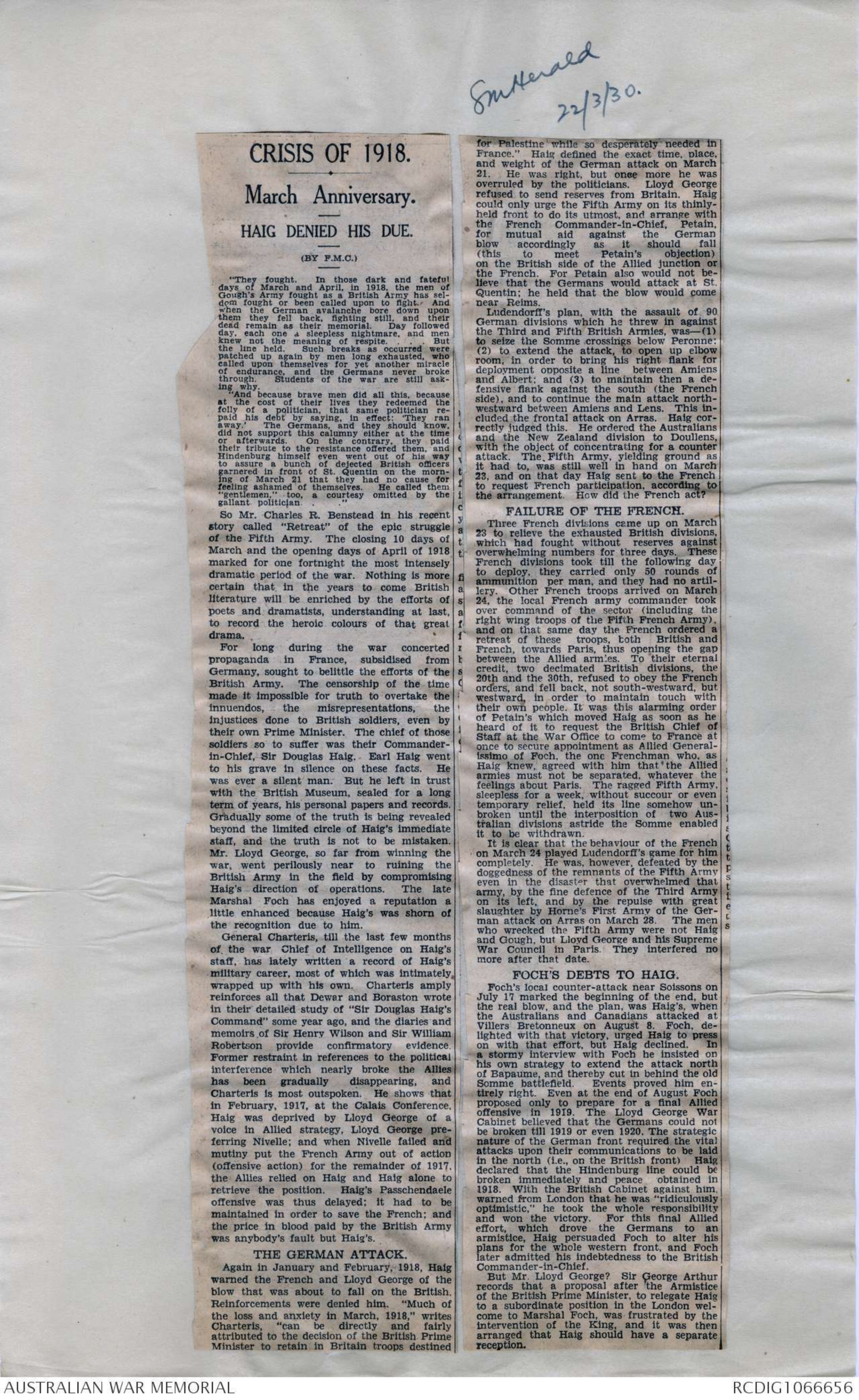
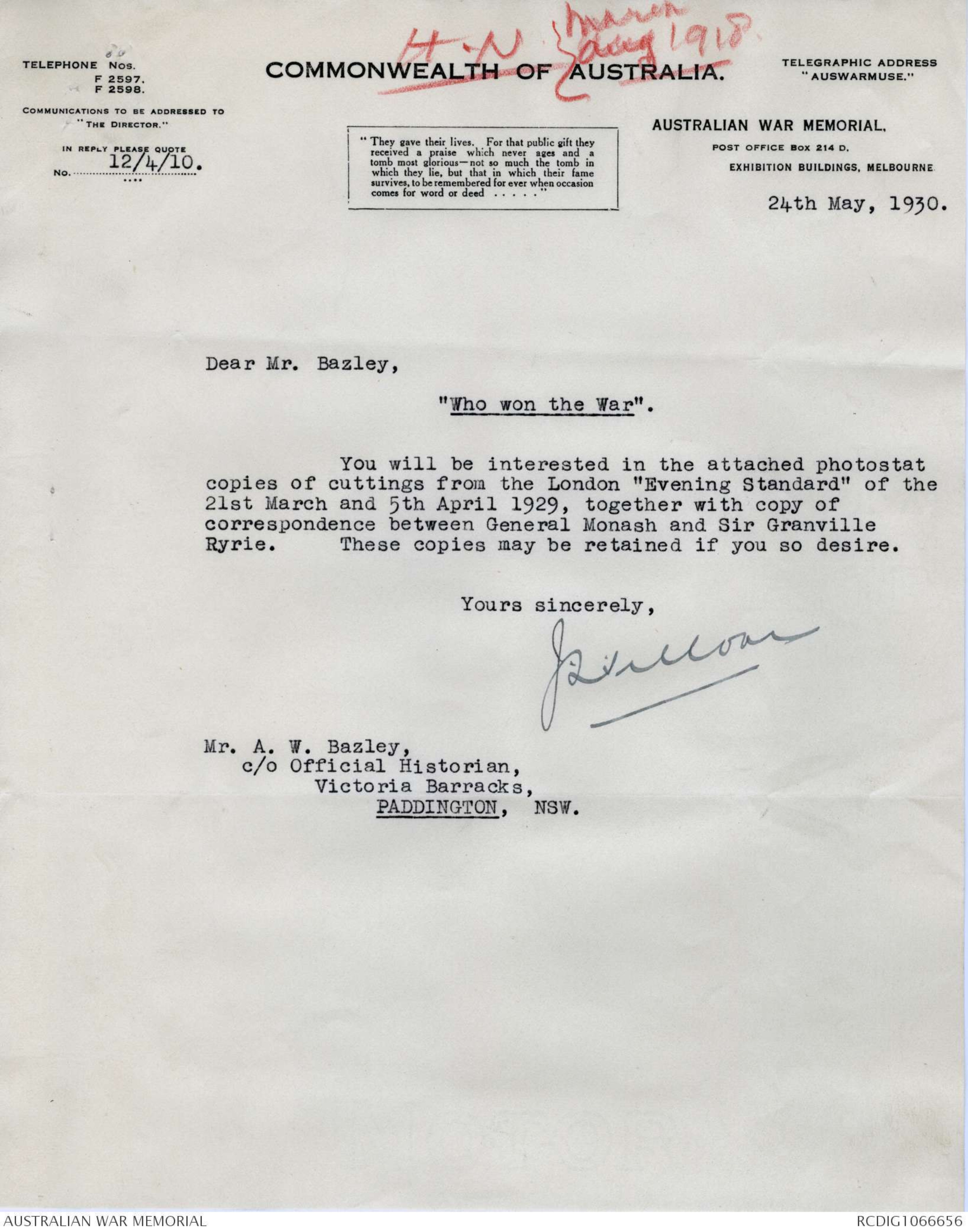
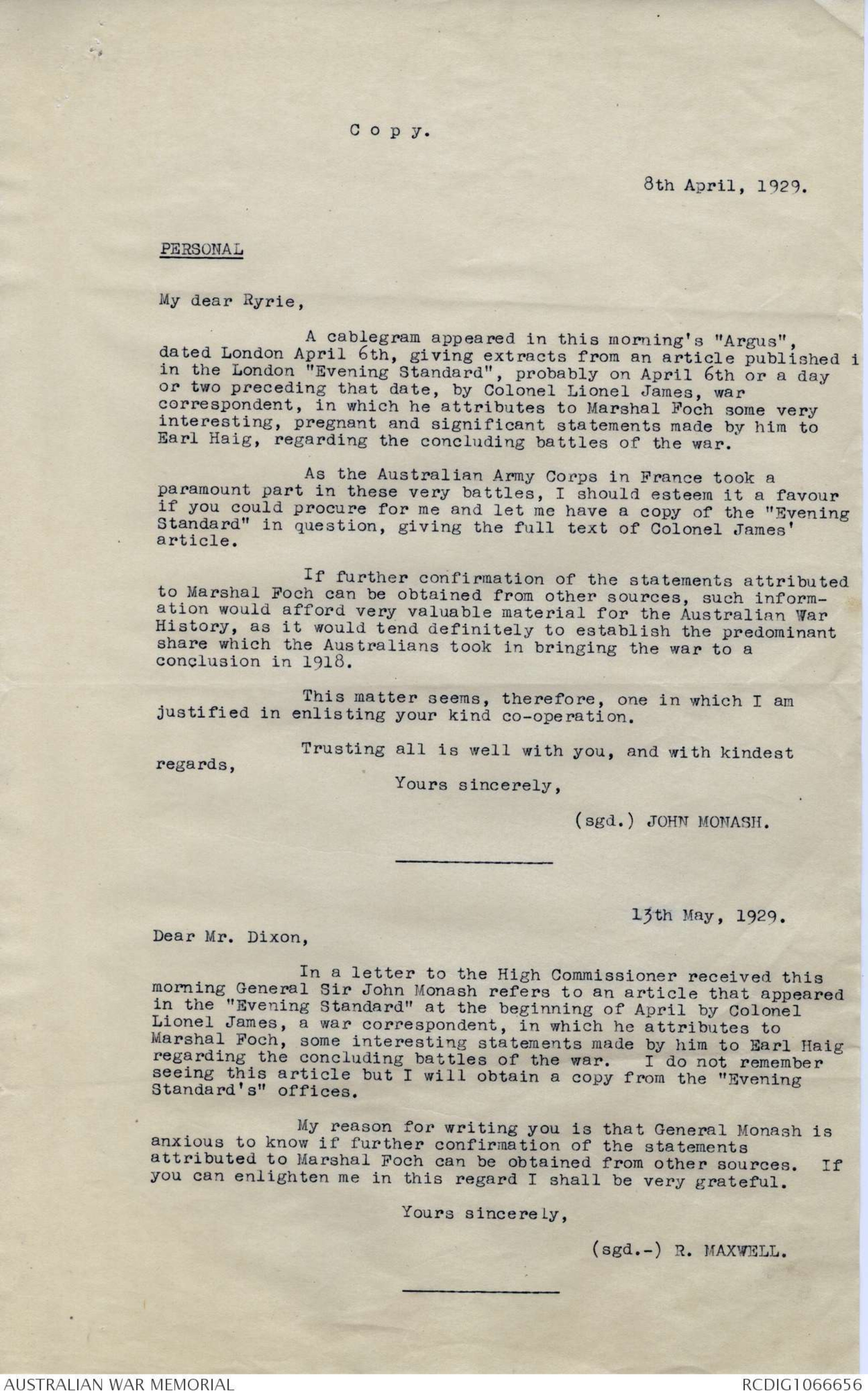
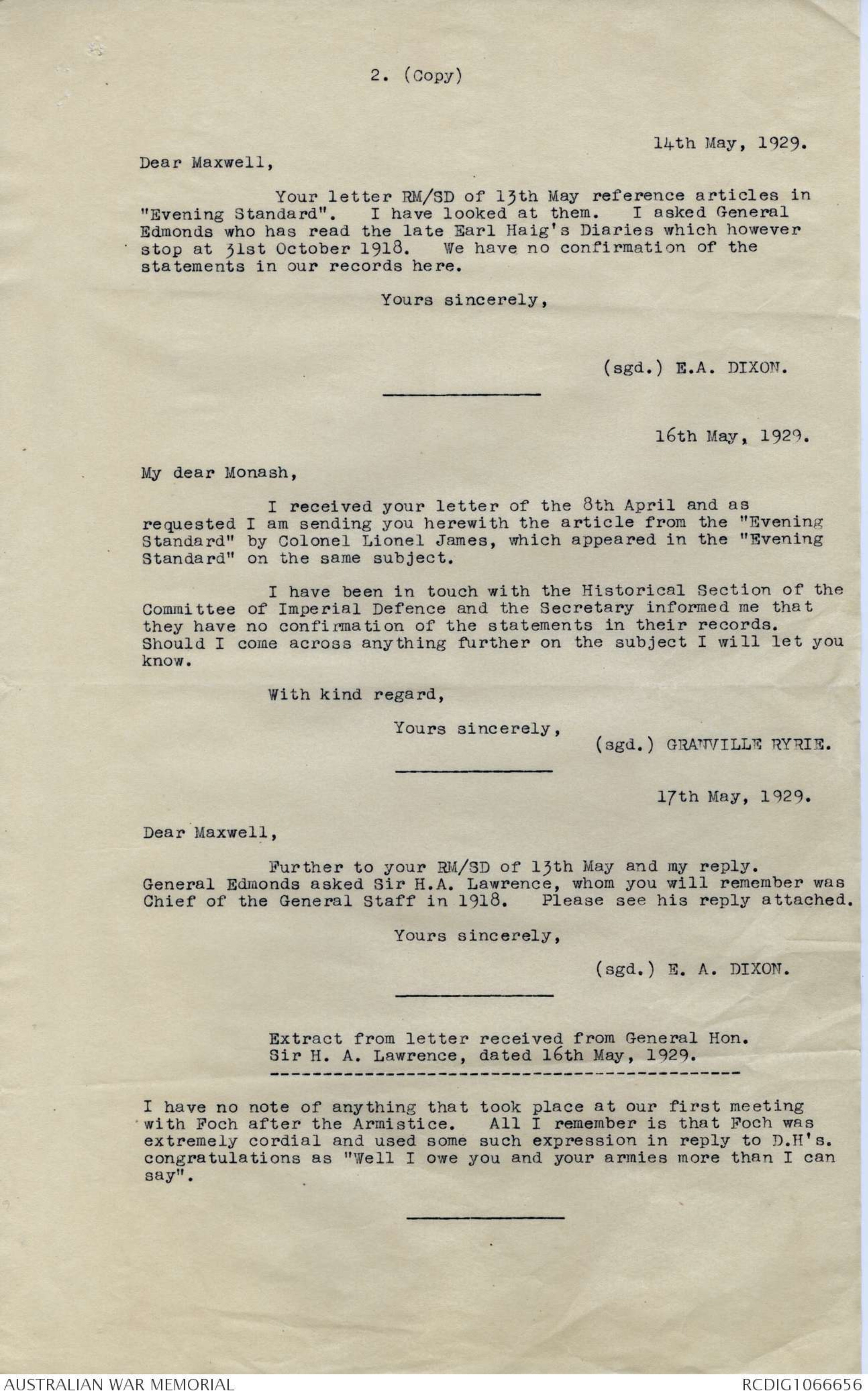
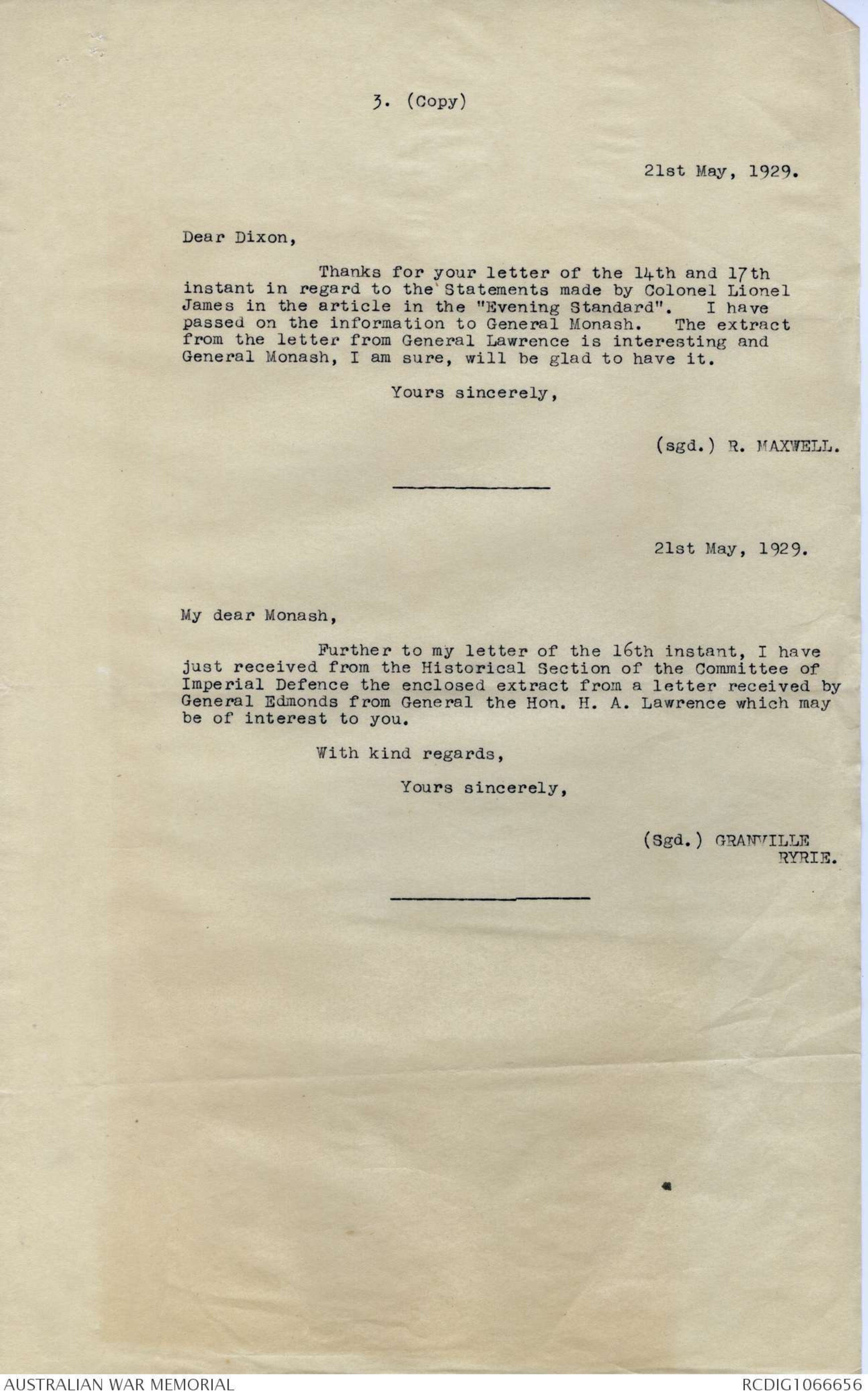
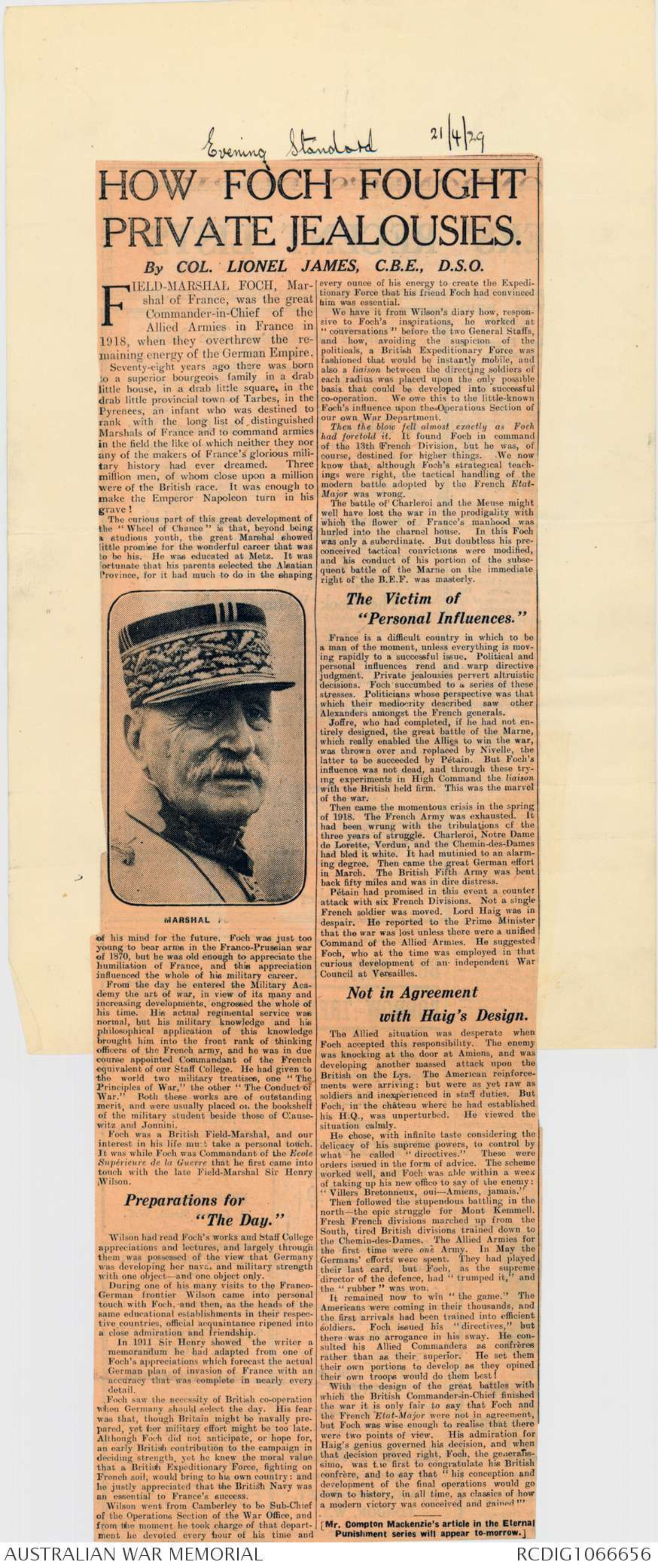
Soldiers & Statesmen
Robertson Vol I 270-271
1 Franco- Brit. Offve not definitely appd by
Cabinet until after March 27 (Confce in Paris)
In spite of Cabinet being warned tt object
of Somme was (1) Repel of Verdun (2) Inflicting of
heavy losses on German arms - it was
abt July 29 showing sensitiveness at
the loss (wh ws wrongly calculated by
Haig i.e. excess over normal).
They asked R whether he thought a
loss of, say, 300,00 men "wd "lead to really
great results, because if not we
ought to be content w something less than
what we are now doing".
Asked why Fr weren't fighting
B Fr were asking why we weren't fighting
V1 army (report on its morale by Brit
staff)
L.George ws never whole-hearted on the W Front
but had to be silenced by R's assurances-
He wd accept them
Aug 29 They approve of the go slow and get ready policy
(27 June)
Aug . Rumania joins - L.G. wants to expand
campaign in Macedonia.
France wants it: Brit Div from Fr & some
tps from eg (40 000) in all) sent.
Nov. location but Somme to close: All 3 objects attained.
[* 49476*]
Third wk end∧of Nov. 1916 L.G. asks Rob. whether we may expect
to win the war by a knock out blow - if
not the advisability of contuing war to the bitter
end wd call for reconsidern.
R. Thinking a party in / Cab. might be wanting
to consider an early peace by negotiation
hit straight out - & sd - if measures were
taken "I am satisfied that the K.O. blow can
& will be delivered".
At the end of the year Asquith ministry fell -
"Throughout 1916 the General Staff were
accorded suitable freedom of action" (286)
R. ws of opinion tt G Brit gave way to her
allies too much (r 8 7)
Man Power.
Jan 1916. All single men & widowers of ^ages between 18-41 to attest.
after a specified date if not volunteering before (293)
(in consequence of Derby pledge - all single
men had to go before the married)
[In Sum] ? May 1916 Military Service Act incld
married men. (Not Ireland).
Aug 1916 man-power distribution board
to supply labour for essential industries - but cdnt
for Depts. to agree.
[*IV / *] June 1916 L.G. min for War. (307) Dec.1916 P.M,
But94 he failed to increase man-pow supply of men
as desired by R. L.G. held tt Labour wdnt
stand any more
compulsion
Robertson
Man Power
p. 308. In winter 1916-17 R thought Gy wd make her
[*VOL IV*] maximum effort in summer 1917.
R had to tell Cabinet in Feb tt army cdnt
be kept up to strength during 1917. now too
late for
measures
Cabinet asks Army Council to
consider reducing bns per divn from 12 to 9.
Gy had made the change & Fr.
(309).
Measures of 1916 brought strength of army to climax
in 1917. Thereafter it declined.
24 Nov 1917 C in C infs. Army Council tt he wd
be 250,000 short in infy by end of Mar 1918.
Haig, present in War Cab. on Jan 7 1918,
makes a statement wh leaves in W. Cab. the
impression tt Gs won't att. on W. Front. that
[*Vol V*] Rob. & Derby both think this will be effect on
W. Cab. Haig doesn't. (Haig ws inarticulate
& possibly nervous - Curzon asked him qns
designed to give him a chance of bringing out
his need for men - & he had assured W. Cab
tt if Gs were wise they wdnt att. A subsequent
letter from Haig ws tossed aside by P.M. at ^ later W. Cab
as being inconsistent w his verbal statement). (324)
R. asks PM for early emplt of Americans arrvng
Brit.
Forecast of Americans (328)
SM Herald 21/3/1928
THE GERMAN ATTACK
Great Drama of 1918.
FIFTH ARMY'S ORDEAL.
(BY F. M. OUTLACK.)
Ten years ago to-day began the great German
offensive in France—Ludendorf's gambler's
throw. Those times seem very far
off; yet it is safe to say that, in city and
country, thousands of Australians will recall
without reminder the war-time crisis of which
to-day is an anniversary, and probably will
debate the old question of the moral of the
Fifth Army. The debate lives, though the
real question has long been settled. The truth
is that the Fifth Army, overwhelmingly
out-numbered, with no supports, and reeling under
the heaviest attack the Germany Army could
deliver, fought one of the bravest soldiers'
Battles in the record of the British Army.
It requires no effort of the imagination
in anyone who survives those great days on
the Western Front to live again the intensity
of the drama which opened on the 21st
of March. The German Army, heavily punished
in the preceding year by one offensive,
after another along the whole British front,
was, early in 1918, reinforced by a great
strength of fresh divisions brought back from
Russia, where the revolution had broken down
opposition. By February a grand enemy attack
was known to be imminent. The Australian
Corps was in Flanders on the Messines
Ridge and Hill 60, confident for a time
that the assault would come upon that
northern portion of the British lines. The central
bastion, the Arras position, was held by the
British Third Army. To the south of it lay the
Fifth Army, weakest of all on its extended
line. When surmise of the German plans
in the Cambrai-St. Quentin sector settled
into a certainty—as evidence grew
pointing to that locality as the chief
scene of enormous German labour in
mounting battle preliminaries—the strain
became painful. Everything that could be done
was done in the organisation of depth in
defence. This was the rule along the whole
British line. As each new morning dawned
in March there was only one question on
everybody's lips: Has it come yet?
THE AUSTRALIANS.
While many training divisions were held
in England, the bulk of the British force in
the field lay in the north and about Arras.
For days before March 21, every Australian
soldier could have told you that orders were
ready for a march south to the Somme again.
No division in the army would escape the
fight that was coming. The period of waiting
became almost intolerable. When the first
news came on the great day, the half of
the Australian Corps in the line at Messines
itched to be relieved. The other half, at
rest behind the lines, was already packing
up. Some officers went and packed as soon
as they read the first news bulletin. Divisional
staffs began cornering lorries. They knew
what the coming orders would be as well as
if they had written them themselves. And
none who lived through that electric time
will ever forget the high enthusiasm of the
Australian march south by rail and road and
on foot, or the singing Digger columns, decked
with dust, and answering cheer for cheer
with the inhabitants of a dozen familiar
French villages on the old rolling down
country of the Somme, known to them like
home. To those veteran battalions, made
veterans in this place, the very sight of the
landscape sent their moral soaring; and the
villagers’ cries of Vive les Australians!
fired the spirits of the weariest. The arrival
in advance of the 4th and 3rd Australian
Divisions in the farmlands behind Herbuterne
and Albert seemed less the approach of
reinforcements into a doubtful battle than a
triumph after great victory. French civilians
preparing to move, unloaded their carts and
stayed. "Fight the Boche, Madame?" said
one Australian officer. We are going to
eat him!"
THE FIFTH ARMY'S TASK.
The diggers’ indomitable confidence was
borne out in many a stiff fight thereafter,
but at the time it led to occasional reflections
upon the fight of the Fifth Army during the
five or six days before the Australians arrived
on the scene. Because here and there some
of that prejudice lingers, it is only right to
say that the first hasty judgment was cruelly
unjust to a number of heroic British divisions,
and a South African brigade, that fought to
the limit of human endeavour. Under the
blow they sustained the thinly-held front at
Cambrai and St. Quentin had eventually either
to break or to bend. Some stigma was attached
to General Gough, who commanded
the Fifth Army; but his dispositions and
his directions in that week of fate have been
since weighed in the balance and found not
wanting, and what judgment of the army he
suffered was based chiefly upon earlier criticism
of his conduct of operations in the Ypres
salient of 1917. The acid question to be put
to Australian critics of the Fifth Army in
March, 1918 is —'"What would the Australian
Corps have done if it had had to hold that
St. Quentin sector as the British had to
hold it?"
The Fifth Army's defence has been contrasted
with that of Byng's Third Army at
Arras, which on March 28 and 29 withstood
the shock of a full-dress German assault of
great ferocity and budged not an inch. Yet
here-again criticism falls before the facts.
On March 21 the Fifth Army, holding 41
miles of front with only 14 infantry divisions
and 3 cavalry divisions (which together about
equalled another division of infantry), had to
meet the onslaught of 46 massed German
divisions. The Third Army on March 28 held
26 miles of front with 19 divisions. and was
opposed by 24 enemy divisions. Gough held
a front more than half as long again as
Byng's, and was outnumbered more than three
to one by an enemy confident of success. Byng
was attacked by a force only a little greater
than his own, and by an enemy already aware
that his blow was being parried.
WHY NO RESERVES?
Why was the Fifth Army left without help
for so long, without reserves? Why, when
the place and finally the date of the attack
had been read by Intelligence with complete
accuracy, was there no arrangement for
supporting the weak defending force against
repeated blows? Was the Fifth Army meant
to be sacrificed?. These questions, bewildering
at the time, or immediately after the German
blow had spent itself, have been answered
since. Colonel Boraston, of British G.H.Q.,
has written (Ninteenth Century, October.
1920):_
The British Commander-in-Chief and his General
Staff had formed the opinion that the most likely
front against which the blow would be directed was
the point of Junction of the French and British
armies, and with this conviction uppermost in his
mind the Commander-in-Chief paid more than one
visit to the French Grand Quartier General at
Compeigne during the winter months of 1917-18..
It can hardly be suggested, then, that the attack
was not expected by the British, or that its front
was not known with a very considerable degree of
accuracy....The discussions with the French had
led to definite arrangements for mutual assistance in
the case of attack. These arrangements provided
specifically for the action to be taken by the French
in the event of an attack such as that which was
actually delivered on the British on March 2l. Plans
for mutual assistance between Allied commanders may
be excellent, but it is their execution at the right
moment that always presents the real difficulty. If
the French command could have been convinced a
the accuracy of the British forecast of events,
detachment of six French divisions should have been
ready on March 21 to take over instantly the right
wing of the British army. The warning had been
ample. Had these divisions been there, or even
in the neighbourhood, there would have been every
chance that with their help the Fifth Army front
would have sustained the German attack as
successfully as did that of the Third Army.
Unfortunately the French Higher Command were
persuaded that a great attack was imminent on the
Laon-Rheims front, and that the anticipated assault
upon the British, If it took place, would prove to be
a diversion. They persisted in this belief even
after the attack had begun... in consequence the
plan for moving up the French reserve group of
divisions was not carried out as agreed. When
the French reserves did begin to arrive, they came
in, many of them, without their guns, without their
cookers, and short of ammunition.
Does not this convey a picture of the Fifth
Army's fight as a tragedy rather than a defeat?
And does not imagination seize an impression
of the bitter trial of Gough and of
Haig before so dreadful a misunderstanding in
an hour of fate? No wonder that on Sunday.
March 24. Haig urgently represented the
necessity for one supreme command for the
Allied armies!
As for the Fifth Army's fight in the fog
(which probably helped them) the record
stands for all to read of how in Maxse's
18th Corps eight battalions fought to the last
in the front zone of the battle and of their
numbers only 50 men returned; how the 36th
(Ulster) Division, repulsed several at-
tacks on their redoubts, and the Inniskilling
Fusiliers and the Royal Irish Rifles stood
their ground till they were annihilated. save
for two tiny parties which cut their way back;
how, of the 14th Division, when, at length,
retreat was ordered, only three battalions
could muster more than a hundred each; how
the 53th Division, outnumbered, outflanked,
and decimated by four German divisions, fought
its gallant rearguard action towards the
French supports, which seemed never to be
going to arrive; and the epic defence of the
left flank and part of Byng's right against
the assault of Marwitz's army at Cambrai.
The retreat of the Fifth Army after the first
day was by order: it was directed to fight a
rearguard action to avoid a break through
until newly-arranged reinforcements could
arrive. The Australians about a week later
saw only the shattered remnants of an army.
which the event proved to have sacrificed it.
self not in vain.
SM Herald
22/3/30.
CRISIS OF 1918.
March Anniversary.
HAIG DENIED HIS DUE.
(BY F.M.C.)
"They fought. In those dark and fateful
days of March and April, in 1918, the men of
Gough's Army fought as a British Army has
seldom fought or been called upon to fight. And
when the German avalanche bore down upon
them they fell back, fighting still, and their
dead remain as their memorial. Day followed
day, each one a sleepless nightmare, and men
knew not the meaning of respite .... But
the line held. Such breaks as occurred were
patched up again by men long exhausted, who
called upon themselves for yet another miracle
of endurance, and the Germans never broke
through. Students of the war are still asking
why.
"And because brave men did all this, because
at the cost of their lives they redeemed the
folly of a politician, that same politician repaid
his debt by saying, in effect: "They ran
away". The Germans, and they should know,
did not support this calumny either at the time
or afterwards. On the contrary, they paid
their tribute to the resistance offered to them, and
Hindenburg himself even went out of his way
to assure a bunch of dejected British officers
garnered in front of St. Quentin on the morning
of March 21 that they had no cause for
feeling ashamed of themselves. He called them
"gentlemen" too, a courtesy omitted by the
gallant politician.
So Mr. Charles R. Benstead in his recent
story called Retreat of the epic struggle
of the Fifth Army. The closing 10 days of
March and the opening days of April of 1918
marked for one fortnight the most intensely
dramatic period of the war. Nothing is more
certain that in the years to come British
literature will be enriched by the efforts of
poets and dramatists, understanding at last,
to record the heroic colours of that great
drama.
For long during the war concerted
propaganda in France, subsidised from
Germany, sought to belittle the efforts of the
British Army. The censorship of the time
made it impossible for truth to overtake the
innuendos, the misrepresentations, the
injustices done to British soldiers, even by
their own Prime Minister. The chief of those
soldiers so to suffer was their Commander-
in-Chief, Sir Douglas Haig. Earl Haig went
to his grave in silence on these facts. He
was ever a silent man. But he left in trust
with the British Museum, sealed for a long
term of years, his personal papers and records.
Gradually some of the truth is being revealed
beyond the limited circle of Haig's immediate
staff, and the truth is not to be mistaken.
Mr. Lloyd George, so far from winning the
war, went perilously near to ruining the
British Army in the field by compromising
Haig’s direction of operations. The late
Marshal Foch has enjoyed a reputation a
little enhanced because Haig's was shorn of
the recognition due to him.
General Charteris, till the last few months
of the war Chief of Intelligence on Haig's
staff, has lately written a record of Haig's
military career, most of which was intimately
wrapped up with his own. Charteris amply
reinforces all that Dewar and Boraston wrote
in their detailed study of Sir Douglas Haig's
Command some year ago, and the diaries and
memoirs of Sir Henry Wilson and Sir William
Robertson provide confirmatory evidence.
Former restraint in references to the political
interference which nearly broke the Allies
has been gradually disappearing, and
Charterls is most outspoken. He shows that
in February, 1817, at the Calals Conference.
Haig was deprived by Lloyd George of a
voice in Allied strategy, Lloyd George
preferring Nivelle; and when Nivelle failed and
mutiny put the French Army out of action
(offensive action) for the remainder of 1917.
the Allies relied on Haig and Haig alone to
retrieve the position. Haig's Passchendaele
offensive was thus delayed; it had to be
maintained in order to save the French; and
the price in blood paid by the British Army
was anybody's fault but Haig's.
THE GERMAN ATTACK.
Again in January and February, 1918, Haig
warned the French and Lloyd George of the
blow that was about to fall on the British.
Reinforcements were denied him. Much of
the loss and anxiety in March, 1918, writes
Charteris, can be directly and fairly
attributed to the decision of the British Prime
Minister to retain in Britain troops destined)
for Palestine while so desperately needed in
France." Haig defined the exact time, place.
and weight of the German attack on March
21. He was right, but once more he was
overruled by the politicians. Lloyd George
refused to send reserves from Britain. Haig
could only urge the Fifth Army on its
thinly-held front to do its utmost, and arrange with
the French Commander-in-Chief, Petain,
for mutual aid against the German
blow: accordingly as it should fall
(this to meet Petain’s objection)
on the British side of the Allied junction of
the French. For Petain also would not believe
that the Germans would attack at St
Quentin; he held that the blow would come
near Reims.
Ludendorff's plan, with the assault of 90
German divisions which he threw in against
the Third and Fifth British Armies, was -(1)
to seize the Somme crossings below Peronne:
(2) to extend the attack, to open up elbow
room, in order to bring his right flank for
deployment opposite a line between Amiens
and Albert: and (3) to maintain then a
defensive flank against the south (the French
side), and to continue the main attack north-
westward between Amiens and Lens. This
included the frontal attack on Arras. Haig
correctly judged this. He ordered the Australians
and the New Zealand division to Doullens,
with the object of concentrating for a counter
attack. The, Fifth Army, yielding ground as
it had to, was still well in hand on March
23, and on that day Haig sent to the French
to request French participation, according to
the arrangement. How did the French act?
FAILURE OF THE FRENCH.
Three French divisions came up on March
23 to relieve the exhausted British divisions,
which had fought without reserves against
overwhelming numbers for three days. These
French divisions took till the following day
to deploy, they carried only 50 rounds of
ammunition per man, and they had no
artillery. Other French troops arrived on March
24, the local French army commander took
over command of the sector (including the
right wing troops of the Fifth French Army).
and on that same day the French ordered a
retreat of these troops, both British and
French, towards Paris, thus opening the gap
between the Allied armies. To their eternal
credit, two decimated British divisions, the
20th and the 30th, refused to obey the French
orders, and fell back, not south-westward, but
westward in order to maintain touch with
their own people. It was this alarming order
of Petain's which moved Haig as soon as he
heard of it to request the British Chief of
Staff at the War Office to come to France at
once to secure appointment as Allied
General-issimo of Foch, the one Frenchman who. as
Haig knew, agreed with him that the Allied
armies must not be separated, whatever the
feelings about Paris. The ragged Fifth Army
sleepless for a week, without succour or even
temporary relief, held its line somehow
unbroken until the interposition of two
Australian divisions astride the Somme enabled
it to be withdrawn.
It is clear that the behaviour of the French
on March 24 played Ludendorff's game for him
completely. He was, however, defeated by the
doggedness of the remnants of the Fifth Army
even in the disaster that overwhelmed that
army, by the fine defence of the Third Army
on its left, and by the repulse with great
slaughter by Horne's First Army of the Ger-
man attack on Arras on March 28. The men
who wrecked the Fifth Army were not Haig
and Gough, but Lloyd George and his Supreme
War Council in Paris. They interfered no
more after that date.
FOCH'S DEBTS TO HAIG.
Foch's local counter-attack near Soissons on
July 17 marked the beginning of the end, but
the real blow, and the plan, was Haig's, when
the Australians and Canadians attacked at
Villers Bretonneux on August 8. Foch, delighted
with that victory, urged Haig to press
on with that effort, but Haig declined. In
a stormy interview with Foch he insisted on
his own strategy to extend the attack north
of Bapaume, and thereby cut in behind the old
Somme battlefield. Events proved him entirely
right. Even at the end of August Foch
proposed only to prepare for a final Allied
offensive in 1919. The Lloyd George War
Cabinet believed that the Germans could not
be broken till 1919 or even 1920. The strategic
nature of the German front required the vital
attacks upon their communications to be laid
in the north (i.e., on the British front) Haig
declared that the Hindenburg line could be
broken immediately and peace, obtained in
1918. With the British Cabinet against him.
warned from London that he was "ridiculously
optimistic", he took the whole responsibility
and won the victory. For this final Allied
effort, which drove the Germans to an
armistice, Haig persuaded Foch to alter his
plans for the whole western front, and Foch
later admitted his indebtedness to the British
Commander-in-Chief.
But Mr. Lloyd George? Sir George Arthur
records that a proposal after the Armistice
of the British Prime Minister, to relegate Haig
to a subordinate position in the London welcome
to Marshal Foch, was frustrated by the
intervention of the King, and it was then
arranged that Haig should have a separate
reception.
H.N. March
Aug 1918
TELEPHONE NOS.
F2597.
F 2598.
TELEGRAPHIC ADDRESS
"AUSWARMUSE."
COMMONWEALTH OF AUSTRALIA.
COMMUNICATIONS TO BE ADDRESSED TO
"THE DIRECTOR."
IN REPLY PLEASE QUOTE
No. 12/4/10.
"They gave their lives. For that public gift they
received a praise which never ages and a
tomb most glorious - not so much the tomb in
which they lie, but that in which their fame
survives, to be remembered for ever when occasion
comes for word or deed......"
AUSTRALIAN WAR MEMORIAL.
POST OFFICE BOX 214 D
EXHIBITION BUILDINGS, MELBOURNE
24th May, 1930.
Dear Mr. Bazley,
"Who won the War".
You will be interested in the attached photostat
copies of cuttings from the London "Evening Standard" of the
2lst March and 5th April 1929, together with copy of
correspondence between General Monash and Sir Granville
Ryrie. These copies may be retained if you so desire.
Yours sincerely,
J Shillom
Mr. A. W. Bazley
c/o Official Historian,
Victoria Barracks,
PADDINGTON,. NSW.
Copy.
8th April, 1929.
PERSONAL
My dear Ryrie,
A cablegram appeared in this morning’s "Argus"
dated London April 6th, giving extracts from an article published i
in the London "Evening Standard", probably on April 6th or a day
or two preceding that date, by Colonel Lionel James, war
correspondent, in which he attributes to Marshal Foch some very
interesting, pregnant and significant statements made by him to
Earl Haig, regarding the concluding battles of the war.
As the Australian Army Corps in France took a
paramount part in these very battles, I should esteem it a favour
if you could procure for me and let me have a copy of the "Evening
Standard" in question, giving the full text of Colonel James'
article.
If further confirmation of the statements attributed
to Marshal Foch can be obtained from other sources, such
information would afford very valuable material for the Australian War
History, as it would tend definitely to establish the predominant
share which the Australians took in bringing the war to a
conclusion in 1918.
This matter seems, therefore, one in which I am
justified in enlisting your kind co-operation.
Trusting all is well with you, and with kindest
regards,
Yours sincerely,
(sgd.) JOHN MONASH.
13th May, 1929.
Dear Mr. Dixon,
In a letter to the High Commissioner received this
morning General Sir John Monash refers to an article that appeared
in the "Evening Standard" at the beginning of April by Colonel
Lionel James, a war correspondent, in which he attributes to
Marshal Foch, some interesting statements made by him to Earl Haig
regarding the concluding battles of the war. I do not remember
seeing this article but I will obtain a copy from the "Evening
Standard’s" offices.
My reason for writing you is that General Monash is
anxious to know if further confirmation of the statements
attributed to Marshal Foch can be obtained from other sources. If
you can enlighten me in this regard I shall be very grateful.
Yours sincerely,
(sgd.-) R. MAXWELL.
2. (Copy)
14th May, 1929.
Dear Maxwell,
Your letter RM/SD of 13th May reference articles in
"Evening Standard". I have looked at them. I asked General
Edmonds who has read the late Earl Haig's Diaries which however
stop at 31st October 1918. We have no confirmation of the
statements in our records here.
Yours sincerely,
(sgd.) E.A. DIXON.
16th May, 1929.
My dear Monash,
I received your letter of the 8th April and as
requested I am sending you herewith the article from the "Evening
Standard" by Colonel Lionel James, which appeared in the "Evening
Standard" on the same subject.
I have been in touch with the Historical Section of the
Committee of Imperial Defence and the Secretary informed me that
they have no confirmation of the statements in their records.
Should I come across anything further on the subject I will let you
know.
With Kind regard,
Yours sincerely,
(sgd.) GRANVILLE RYRIE.
17th May, 1929.
Dear Maxwell,
Further to your RM/SD of 13th May and my reply.
General Edmonds asked Sir H.A. Lawrence, whom you will remember was
Chief of the General Staff in 1918. Please see his reply attached.
Yours sincerely,
(sgd.) E. A. DIXON.
Extract from letter received from General Hon.
Sir H. A. Lawrence, dated 16th May, 1929.
I have no note of anything that took place at our first meeting
with Foch after the Armistice. All I remember is that Foch was
extremely cordial and used some such expression in reply to D.H's.
congratulations as "Well I owe you and your armies more than I can
say".
3. (Copy)
2lst May, 1929.
Dear Dixon,
Thanks for your letter of the 14th and 17th
instant in regard to the Statements made by Colonel Lionel
James in the article in the "Evening Standard". I have
passed on the information to General Monash. The extract
from the letter from General Lawrence is interesting and
General Monash, I am sure, will be glad to have it.
Yours sincerely,
(sgd.) R. MAXWELL.
2lst May, 1929.
My dear Monash,
Further to my letter of the 16th instant, I have
just received from the Historical Section of the Committee of
Imperial Defence the enclosed extract from a letter received by
General Edmonds from General the Hon. H. A. Lawrence which may
be of interest to you.
With Kind regards,
Yours sincerely,
(Sgd.) GRANVILLE
RYRIE.
Evening Standard 21/4/29
HOW FOCH FOUGHT
PRIVATE JEALOUSIES.
By COL. LIONEL JAMES, C.B.E., D.S.O.
FIELD-MARSHAL FOCH, Marshal
of France, was the great
Commander-in-Chief of the
Allied Armies in France in
1918, when they overthrew the remaining
energy of the German Empire,
seventy-eight years ago there was born
to a superior bourgeois family in a drab
little house, in a drab little square, in the
drab little provincial town of Tarbes, in the
Pyrenees, an infant who was destined to
rank with the long list of distinguished
Marshals of France and to command armies
in the field the like of which neither they nor
any of the makers of France's glorious military
history had ever dreamed. Three
million men, of whom close on a million
were of the British race. It was enough to
make Emperor Napoleon turn in his
grave!
The curious part of this great development of
the "Wheel of Chance" is that, beyond being
a studious youth, the great Marshal showed
little promise for the wonderful career that was
to be his. He was educated at Motz. It was
fortunate that his parents selected the Alsatian
Province, for it had much to do in the shaping
Photo - see original document
of his mind for the future. Foch was just too
young to bear arms in the Franco-Prussian war
of 1870, but he was old enough to appreciate the
humiliation of France, and this appreciated
influence the who of his military career.
From the day he entered the Military
Academy the art of war, in view of its many and
increasing developments, engrossed the whole of
his time. His actual regimental service was
normal, but his military knowledge and his
philosophical application of this knowledge
brought him in the the front rank of thinking
officers of the French army, and he was in due
course appointed Commandant of the French
equivalent of our Staff College. He had given to
the world two military treatises, one "The
Principles of War" the other "The Conduct of
War". Both these works are of outstanding
merit, and were usually place on the bookshelf
of the military student beside those of Causewitz
and Jonnini.
Foch was a British Field-Marshall, and our
interest in his life must take a personal touch.
It was while Foch was Commandant of the Ecole
Supéricure de la Guerre that he first came into
touch with the late Field-Marshal Sir Henry
Wilson.
Preparations for
"The Day".
Wilson had read Foch's works and Staff College
appreciations and lectures, and largely through
them was possessed of the view that Germany
was developing her naval and military strength
with on object-and one object only.
During one of his many visits to the Franco-German
frontier Wilson came into personal
touch with Foch, and the, as the heads of the
same educational establishments in their
respective countries, official acquaintance ripened into
a close admiration and friendship.
In 1911 Sir Henry showed the writer a
memorandum he had adapted from one of
Foch's appreciations which forecast the actual
German plan of invasion of France with an
accuracy that was complete in nearly every
detail.
Foch saw the necessity of British co-operation
when Germany should select the day. His fear
was that, though Britain might be navally
prepared, yet her military effort might be too late.
Although Foch did not anticipate, or hope for,
an early British contribution to the campaign in
deciding strength, yet he knew the moral value
that a British Expeditionary Force, fighting on
French soil, would bring to his own country: and
he justly appreciated that the British Navy was
an essential to France's success.
Wilson went from Camberley to the Sub-Chief
of Operations Section of the War Office, and
from the moment he took charge of that
department he devoted every hour of his time and
every ounce of his energy to create the Expeditionary
Force that his friend Foch had convinced
him was essential.
We have it from Wilson's diary how, responsive
to Foch's inspirations, he worked at
"conversations" before the two General Staffs,
and how, avoiding the suspicion of the
politicals, a British Expeditionary Force was
fashioned that would be instantly mobile, and
also a liaison between the directing soldiers of
each radius was placed upon the only possible
basis that could be developed into successful
co-operation. We own this to the little-known
Foch's influence upon the Operations Section of
our own War Department.
Then the blow fell almost exactly as Foch
had foretold it. It found Foch in command
of the 13th French Division, but he was, of
course, destined for higher things. We now
know that, although Foch's strategical teachings
were right, the tactical handling of the
modern battle adopted by the French État-Major
was wrong.
The battle of Charleroi and the Meuse might
well have lost the war in the prodigality with
which the flower of France's manhood was
hurled into the charnel house. In this Foch
was only a subordinate. But doubtless his
preconceived tactical convictions were modified,
and his conduct of his portion of the subsequent
battle of the Marne on the immediate
right of the B.E.F. was masterly.
The Victim of
"Personal Influences".
France is a difficult country in which to be
a man of the moment, unless everything is
moving rapidly to a successful issue. Political and
personal influences rend and warp directive
judgment. Private jealousies pervert altruistic
decisions. Foch succumbed to a series of these
stresses. Politicians whose perspective was that
which their mediocrity described saw other
Alexanders amongst the French generals.
Joffre, who had completed, if he had not entirely
designed, the great battle of the Marne,
which really enabled the Allies to win the war
was thrown over and replaced by Nivelle, the
latter to be succeeded by Pétain. But Foch’s
influence was not dead, and through these
trying experiments in High Command the liaison
with the British held firm. This was the marvel
of the war.
Then came the momentous crisis in the spring
of 1918. The French Army was exhausted. It
had been wrung with the tribulations of the
three years of struggle. Charleroi, Notre Dame
de Lorette, Verdun, and the Chemin-des-Dames
had bled it white. It had mutinied to an alarming
degree. Then came the great German effort
in March. The British Fifth Army was bent
back fifty miles and was in dire distress.
Pétain had promised in this event a counter
attack with six French Divisions. Not a single
French soldier was moved. Lord Haig was in
despair. He reported to the Prime Minister
that the war was lost unless there were a unified
Command of the Allied Armies. He suggested
Foch, who at the time was employed in that
curious development of an independent War
Not in Agreement
with Haig's Design
The Allied situation was desperate when
Foch accepted this responsibility. The enemy
was knocking at the door at Amiens, and was
developing another massed attack upon the
British on the Lys. The American reinforcements
were arriving: but were as yet raw as
soldiers and inexperienced in staff duties. But
Foch, in the chateau where he had established
his H.Q, was unperturbed. He viewed the
situation calmly
He chose, with infinite taste considering the
delicacy of his supreme powers, to control by
what he called "directives." These were
orders issued in the form of advice. The scheme
worked well, and Foch was able within a week
of taking up his new office to say of the enemy:
"Villers Bretonneux, oui —Amiens, jamais."
Then followed the stupendous battling in the
north—the epic struggle for Mont Kemmell
Fresh French divisions marched up from the
South, tired British divisions trained down to
the Chemin-des-Dames. The Allied Armies for
the first time were one Army. In May the
Germans’ efforts were spent. They had played
their last card, but Foch, as the supreme
director of the defence, had "trumped it," and
the "rubber" was won.
it remained now to win "the game." The
Americans were coming in their thousands, and
the first arrivals had been trained into efficient
soldiers. Foch issued his "directives," but
there was no arrogance in his sway. He consulted
his Allied Commanders as confrères
rather than as their superior. He set them
their own portions to develop as they opined
their own troops would do them best!
With the design of the great battles with
which the British Commander-in-Chief finished
the war it is only fair to say that Foch and
the French État-Major were not in agreement,
but Foch was wise enough to realise that there
were two points of view. His admiration for
Haig’s genius governed his decision, and when
that decision proved right, Foch, the
general-issimo, was the first to congratulate his British
confrère, and to say that his conception and
development of the final operations would go
down to history, in all time, as classics of how
a modern victory was conceived and gained.
[Mr. Compton Mackenzie's article in the Eternal
Punishment series will appear to-morrow.]
AUSTRALIAN WAR MEMORIAL
 Sam scott
Sam scottThis transcription item is now locked to you for editing. To release the lock either Save your changes or Cancel.
This lock will be automatically released after 60 minutes of inactivity.